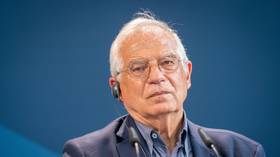EU foreign policy chief reacts to African coup

European Union defense ministers will discuss the situation in the Central African state of Gabon, the bloc’s foreign-policy chief Josep Borrell said on Wednesday. His comments came after soldiers of the former French colony announced that they had assumed political control in the country.
“If this is confirmed, it is another military coup which increases instability in the whole region,” Borrell said, during a meeting of EU defense ministers in the Spanish city of Toledo reported-on by Reuters.
A group of Gabonese soldiers appeared on national television in the early hours of Wednesday, saying they had dissolved state institutions and canceled the results of the country’s disputed elections.
The move came after Gabon’s longtime leader, Ali Bongo, was declared the winner of last week’s presidential election, giving him the green light to govern for a third term.
The soldiers denounced Bongo's “irresponsible, unpredictable governance,” claiming his 14 years in office had resulted in a “deterioration in social cohesion that risks leading the country into chaos.”
The coup in Gabon is the latest in a series of military takeovers in Africa in recent years, coming just weeks after soldiers seized power in Niger.
The new military rulers in Niger, another former French colony, have refused to release ousted President Mohamed Bazoum and restore democratic rule, despite pressure from the 15-nation West African Regional bloc, ECOWAS.
The regional authority has activated a standby force for a military intervention backed by France, which it has threatened to use against the coup leaders in Niamey if diplomatic efforts fail.
Mali and Burkina Faso, both military-ruled countries, have warned against armed action directed at their counterparts in Niger.
While expressing concern about the situation in Gabon, which has a population of nearly 2.5 million, Borrell stated that coups in other parts of the continent are “a big issue for Europe.”
“The whole area, starting with Central African Republic, then Mali, then Burkina Faso, now Niger, maybe Gabon, it’s in a very difficult situation and certainly the [EU] ministers... have to have a deep thought on what is going on there and how we can improve our policy in respect with these countries,” he said.













